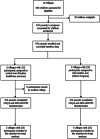Community-based intervention to improve measles vaccination completion in marginalised community settlements in Kota Kinabalu, Sabah: a cluster randomised control trial
- PMID: 40221693
- PMCID: PMC11992852
- DOI: 10.1186/s12879-025-10902-w
Community-based intervention to improve measles vaccination completion in marginalised community settlements in Kota Kinabalu, Sabah: a cluster randomised control trial
Abstract
Background: The COVID- 19 pandemic significantly impacted health services, particularly immunisation services, reducing the coverage of measles immunisation from the targeted 95%. This has resulted in post-pandemic measles outbreaks globally, and those at risk in Sabah are the marginalised population, who encounter barriers when it comes to getting measles immunisation. In this study, a community-based intervention was implemented to evaluate the effectiveness of a community-based intervention in improving the measles-containing vaccine (MCV) completion rate and assessing the community's acceptance of and satisfaction with the proposed intervention programme.
Method: The study applied a cluster randomised control trial (RCT). The intervention involved trained community volunteers who were trained on the reminder and recall strategy to help ensure the completion of the MCV among children in the community, where three doses of measles vaccine were provided when they were 6, 9, and 12 months of age. The intervention was administered in five settlements over a period of six months. As a comparison, another five settlements were provided with regular vaccination health services. The rates of MCV completion between the intervention group versus control group that received regular vaccination health services were then compared. The community's acceptance of and satisfaction with the intervention were assessed using a validated Acceptability of Intervention Measure-Intervention Appropriateness Measure-Feasibility of Intervention Measure (AIM-IAM-FIM) and Client Satisfaction Questionnaire 8 (CSQ- 8).
Result: The findings of the study showed that the rate of completion of the three doses of measles vaccine was slightly higher among those who received the intervention (80.4%) with a lower percentage having received one dose (2.6%) and no dose at all compared to those who only received routine healthcare services. Furthermore, the odds of having completed the MCV increased by three times for those who received the intervention (AOR: 2.848, 95% CI: 0.176, 45.996), although it was not significant. There was also a six-fold increase in the satisfaction score among those who received the community-based intervention compared to those who received the routine vaccination services (p = < 0.001, 95% CI = 2.634, 8.919). Finally, the majority (97%) of those in the community accepted the implemented intervention.
Conclusion: A community-based intervention has the potential to enhance the completion of MCV, but it has to be refined further to be successful. The findings of this study can provide information to policy makers and implementers of vaccination programmes regarding the importance of engaging marginalised communities and ensuring their acceptance of and satisfaction with the intervention to achieve the desired target.
Trial registration: This study was retrospectively registered at the International Standard Randomised Controlled Trial Number (ISRCTN) Registry (ISRCTN12774704) on 17 th November 2023.
Keywords: Community participation; Measles immunisation programme; Public health interventions; Social determinants of health.
© 2025. The Author(s).
Conflict of interest statement
Declarations. Ethics approval and consent to participate: Ethical approval for this study is obtained from the Medical Research and Ethics Committee (NMRR ID- 22–00051 - 88 T (IIR)) Ministry of Health, Malaysia as well as the ethical committee of University Malaysia Sabah (JKEtika 1/22 (2)). Every participant gave their written authorization after being informed of the study’s objectives and any potential negative side effects. Consent for publication: Not applicable. Competing interests: The authors declare no competing interests.
Figures
References
-
- WHO. Measles. World Health Organization. 2023. https://www.who.int/news-room/fact-sheets/detail/measles#:~:text=During2....
-
- Communities vulnerable without immunization against infectious diseases. UNICEF. 2020. https://www.unicef.org/malaysia/press-releases/communities-vulnerable-wi....
Publication types
MeSH terms
Substances
LinkOut - more resources
Full Text Sources
Medical
Research Materials




